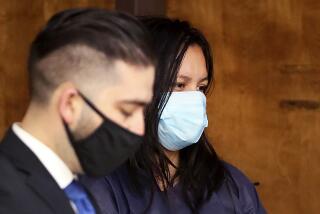Hung Jury on Manslaughter Counts : Twins’ Mother Convicted of Child Endangerment
- Share via
Beverly Jean Ernst was found guilty Thursday of felony child endangerment, but not manslaughter, in the deaths of her twin infants, who died of heatstroke after she left them unattended in her car for five hours last summer in Garden Grove.
After a three-week trial, the Orange County Superior Court jury of eight men and four women was unable to reach a unanimous decision on involuntary manslaughter charges against Ernst. The jurors were deadlocked 9 to 3 in favor of a guilty verdict when a mistrial on those charges was declared.
When the 26-year-old Anaheim woman is sentenced on June 19 by Superior Court Judge Jean H. Rheinheimer, she faces a maximum sentence of seven years and three months in prison. Deputy Dist. Atty. Wallace J. Wade said no decision has been made on whether to retry her on the manslaughter charges.
Ernst left the courtroom in tears after the verdict was read.
Several jurors said afterward that whatever sympathy they felt for her was overshadowed by their heartache over the 3-month-old victims, Adam and Ashley.
“You don’t ever leave infants alone in a car-- ever, “ said one juror, Karileen Vail of Cypress, who has two young children of her own.
According to testimony at the trial, Ernst and a boyfriend, Scott Morrow, went to a coffee shop with the infants about 3 a.m. on July 20, 1986, and returned shortly after 7 a.m. to a supply shop on Euclid Street where Morrow was living.
Both testified that Ernst left the twins in the car and went inside the shop at Morrow’s invitation. Both fell asleep on a bed, according to the testimony, and neither woke up until shortly after noon, when the owner of the store, Leonard Wosic, came in.
Pathology reports showed that the children died no later than 10:30 a.m. The temperature inside the car, which had one window cracked about two inches, may have reached 120 degrees, according to evidence introduced at the trial.
Ernst testified that she did not take the infants inside the shop because it was dirty and that she meant to stay only a few minutes. She said she did not mean to fall asleep but only to lie on the bed to rest for a few minutes. She also said Morrow had agreed to “listen” for the children for her.
But some of the jurors said her intentions and whatever promise Morrow might have made to watch the children did not justify her conduct.
“What mother takes her children to a coffee shop at 3 o’clock in the morning?” said Margaret Andras, a Huntington Beach grandmother. “We felt there was a pattern of reckless behavior on her part. It was very poor conduct for a mother.”
Several jurors said they were influenced by testimony brought out by the prosecution showing that Ernst had been warned by others, including her brother, about the danger of leaving the children alone in the car.
Jurors said they were split 9 to 3 on the involuntary manslaughter counts from the time they began deliberations Monday afternoon. Most agreed afterward that there was no chance they would have reached agreement on those two counts.
One of the three who held out for a verdict of not guilty on the involuntary manslaughter charges was the jury foreman, Nick Veres of Garden Grove, who is a grandfather. Veres said he and two other jurors, a man and a woman, thought Ernst’s good intentions when she entered the supply shop saved her from a guilty verdict on those charges.
But Veres agreed with the others that Ernst’s lies to a paramedic showed her guilt on the child-endangerment charges. She told the paramedic that the infants had been in the car only about 20 minutes.
Information to Help Children
Jurors Tom Belprey of Huntington Beach and Vail said they believed that Ernst should have been giving the paramedics information that might have helped the children instead of a statement intended to save herself. Ernst, they believed, could not have known then that the children already were dead.
Throughout the trial, Deputy Public Defender Dennis P. O’Connell depicted his client as a victim of her circumstances. In his closing argument, he asked jurors to consider Ernst’s plight at the time of the tragedy.
She was not living with the twins’ father, who has not been publicly identified. She had been forced to leave her mother’s home, and she was being forced out of a friend’s house where she had been staying. The day she went to Morrow’s shop, she was trying to find a job and a place for her and the twins to live.
“She was with those babies 24 hours a day. Is that the conduct of a woman who would walk into that shop totally oblivious to the welfare of her children?” O’Connell asked the jurors.
Belprey, who is single and has no children, said those arguments were not enough to excuse her for leaving the twins alone in the car.
“We felt sorry she lost her children, but we also felt sorry for two dead babies who had relied on her to protect them,” Belprey said.
Sid Barnett of Seal Beach Leisure World, who voted to convict her on all four counts, said Ernst’s tears on the witness stand did not evoke sympathy from the jurors.
“Not when you think of the kids who died,” Barnett said.
During Ernst’s testimony, Wade asked her if she felt responsible. She answered: “Of course I was responsible. I’m their mother.”
Morrow was not arrested in the incident but was taken into custody last fall after he left the state shortly before he was scheduled to testify at Ernst’s preliminary hearing. O’Connell placed the blame for the children’s deaths on Morrow. According to Veres, that affected the jury’s decision.
Judge’s Guidance Sought
During their deliberations Thursday morning, the jury asked for Judge Rheinheimer’s guidance on the involuntary manslaughter charges. They asked whether they should give more weight to Ernst’s intentions or her actions. When the judge told them that she couldn’t help them with that dilemma, the jurors quickly returned with the guilty verdict on the child-endangerment charges and told the judge that they were hopelessly deadlocked on the other counts.
Judge Rheinheimer told the jurors before excusing them: “Sometimes a hung jury is as responsive as one which reaches a verdict.”
Because Ernst has no serious criminal record, O’Connell believes that she should be an excellent candidate for probation. He said before the trial that he did not think prosecutors would want her to go to jail if they won a conviction.
Prosecutor Wade said he won’t know what sentence to recommend until he reads a probation report.
Technically, the district attorney’s office could ask for a new trial on the involuntary manslaughter charges. Rheinheimer set a July 6 date for a hearing on that issue. But even if convicted on those counts, any sentence served would be concurrent with the child-endangerment sentence.
Nonetheless, Wade said he won’t decide what to do on those counts until after he talks to O’Connell.
Wade said he was pleased with the verdict.
“This is not a case of victory or defeat,” Wade said. “Justice was done, and I’m thankful and proud of the jurors. This was a tough case.”
O’Connell said later that he was “very disappointed. Most people I’ve talked to about this case let their emotions take over, and they condemn Beverly before they’ve heard the facts. I’m afraid this jury did the very same thing.”
Took Verdict Hard
O’Connell said his client took the verdict very hard but was composed by the time she left his office late Thursday morning.
“She’s going to get away with friends for a few days to try to forget about it for a while,” O’Connell said.
Ernst has two other young children from a previous marriage. Those youngsters, ages 6 and 5, now live with her former parents-in-law in Illinois. Ernst said she decided not to marry the father of the twins, and he has not been involved in the case.
Ernst was in jail for six days after her arrest the day the babies died. But since then she has been free without bail and has returned to live with her mother. O’Connell said she is unemployed.
She kept her head down during most of the trial and was often in tears. She spent much of the time writing on yellow paper. Ernst had told a reporter earlier that constant writing is a habit of hers and that she sometimes writes poetry.
She refused during the trial to talk with reporters.
But after her preliminary hearing last October, she said in an interview that she felt alone the day she went to Morrow’s supply store.
“It seemed like everyone was against me,” she said. “You’re stupid. You shouldn’t have gotten pregnant. . . . I felt so out of place.”
She also showed a reporter some poetry she had written about her dead twins:
“How could anything that was once so happy, so fulfilling, so beautiful, now be so blue, so empty, so ugly. . . . “
More to Read
Sign up for Essential California
The most important California stories and recommendations in your inbox every morning.
You may occasionally receive promotional content from the Los Angeles Times.










